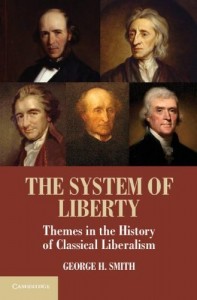George H. Smith’s new book, The System of Liberty
 Very excited to have just received through the post a copy of George H. Smith’s latest book, The System of Liberty: Themes in the History of Classical Liberalism (Cambridge: Cambridge University Press & Cato Institute, 2013) – and I’ve already started in on it!
Very excited to have just received through the post a copy of George H. Smith’s latest book, The System of Liberty: Themes in the History of Classical Liberalism (Cambridge: Cambridge University Press & Cato Institute, 2013) – and I’ve already started in on it!
My excitement stems from knowing George and the quality of his scholarship. Indeed, I have had the great privilege to have studied with George – well over two decades ago – at summer seminars organised by the Institute for Humane Studiesand the Cato Institute; and I found his lectures on Natural Rights and the theory and history of the American Revolution extremely thought-provoking and filled with insight.
George H. Smith is one of the world’s leading scholars on the ideas of liberty, particularly on the development of those classical liberal ideas that came together in the 17th Century in the writings of the Levellers (Richard Overton and Col. John Lilburne) during the English Civil War, Algernon Sydney, and, most famously, John Locke. As Smith explains, his book explores the emergence and theoretical implications of what he calls the “Lockean Paradigm.” He writes:
By this I mean a constellation of key concepts that has historically been used to address the fundamental and recurring problems of political philosophy. The concepts include natural rights, social contract, consent, property, and the rights of resistance and revolution.
Although Locke did not originate these concepts or how they functioned in political controversies, they have been more closely linked to his name than any other philosopher. Indeed, when considering a person who defended similar ideas before Locke was even born, we are apt to describe those ideas, if integrated in a certain manner, as “Lockean.” (p. 5)
Such ideas were transmitted to the New World by pamphleteers like John Trenchard and Thomas Gordon (who penned the famous Cato Letters at the turn of the 18th Century); they were carried across the Atlantic by the colonists and underpinned their jurisprudence; they were articulated by priests in weekly sermons; they were debated in taverns and correspondence committees… and, ultimately, came to inform the political thought of America’s Founding Fathers, such as Thomas Jefferson and John Adams, and were widely popularised by Thomas Paine, notably in Commonsense (1776).
From my reading so far, The System of Liberty is already proving to be a stimulating discussion of the key themes of classical liberalism, tracing their historical development and implications, and, also how they came to be eclipsed by the ideas of “new liberalism” as well as their continued relevance for today.
Once I’ve finished, The System of Liberty demands a fuller review and consideration of its themes but, as an interim report, George H. Smith’s new book is certainly shaping up to be “a must read” for all students of liberty.